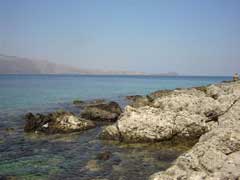 MSSD Priority Field of Action for water resources
MSSD Priority Field of Action for water resources
One of the seven priority fields of action is: Improving integrated water resource and water demand management
| Released | 06/04/2006 |
|---|
Many or most Mediterranean countries are faced with several water-related issues: how to manage their scarce water resources sustainably; how to secure access to safe drinking water for population groups who do not yet have it; and how to accustom individual consumers to practices which save water.
The first challenge requires water demand management policies to reduce loss and misuse, the development of more added value through greater efficiency in irrigation and in the use of water in industry and urban areas; and the meeting of economic and social needs at reduced cost. It also requires the integrated management of catchment areas and wetland ecosystems and an increase in water supply, particularly through the development of non-conventional sources of water.
The second challenge requires the achievement of the MDGs concerning access to safe drinking water and sanitation. The third necessitates the strengthening of partnerships with local water users and water management bodies and awareness-raising campaigns on how to save water.
Some countries in both the North and the South have began to undertake more fficient water management, as called for by the Johannesburg Summit. The EU has launched a water initiative, the Mediterranean component of which represents a cooperation framework conducive to the attainment of the MDGs in the region.
Objectives:
- Stabilize water demand through the reduction of water losses and the wasteful use of water (a reduction in demand in the North and controlled increases in the South and the East) and increase the added value per cubic metre of water used.
- Promote the integrated management of watersheds, including surface and groundwater; and eco-systems, and foster depollution objectives.
- Achieve the Millennium Development Goals concerning access to safe drinking water and sanitation.
- Promote participation, partnership, active cooperation and solidarity for the sustainable management of water, at local and national level.
Orientations and actions:
Regional Cooperation
1. Promote the Mediterranean component of the European Union Water Initiative as one of the means of achieving the MDGs and of the Johannesburg Plan of Implementation. Strengthen synergies with donors in support of investment and with other regional cooperation frameworks
Water demand management
2. Determine precise global and sectoral efficiency goals in national strategies. Reorient water policies to integrate water demand management in agriculture and other sectoral policies and encourage demand-side approaches with the aim of improving water use efficiency, reducing unnecessary losses, implementing water saving techniques in irrigation and involving industry, tourism and cities in controlling waste water.
3. Establish appropriate fiscal and pricing systems and encourage investment in demand-side management and the development of financial mechanisms for the internalization of external costs and the expected benefits from water-saving measures.
Integrated water resource management
4. Encourage the establishment of appropriate bodies and organizations for integrated watershed, management (surface, groundwater resource and ecosystems), in qualitative and quantitative terms. Strengthen international commitments undertaken for the management of transboundary water resources.
5. Preserve and increase water resources through soil and water conservation measures, agricultural and forestry practices, small-scale irrigation, run off and spate irrigation and the mobilization of non conventional sources of water, as well as the recycling of urban and industrial wastewaters and drainage water, taking into account quality standards.
6. Strengthen regulatory and other instruments, where appropriate, to reduce the over-exploitation of groundwater and non-renewable water sources and promote the artificial replenishment of groundwater, where necessary.
7. Protect aquatic ecosystems and restore their regulating role.
Access to water and sanitation
8. Support investment to halve by 2015 the proportion of the population without access to safe drinking water and sanitation, pursuant to the MDGs.
9. Strengthen regulations, where appropriate, and promote investment in wastewater treatment systems to prevent and reduce pollution from urban and industrial sources.
Water management governance
10. Promote schemes for the integrated participatory management of water resources, including partnerships with local authorities, the private sector and NGOs.
11. Take action to educate users about the need to save water, and protect its quality.
 you are not logged in
you are not logged in





